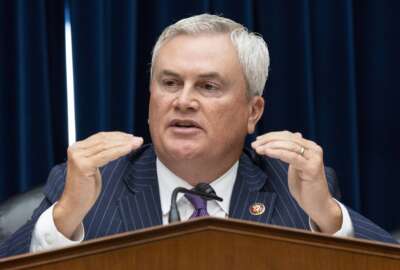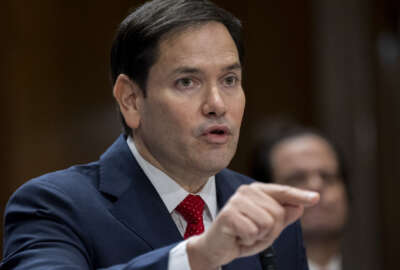A premier college program for public service celebrates 90 years
"We really focus on creating leaders who focus on self-awareness, emotional intelligence, building relationships," said Russell Robinson.
American University’s School of Public Affairs launched during the Franklin Roosevelt administration. At 90, the school is still innovating with a program called the Key Undergraduate Leadership Program. Professor Russell Robinson joined the Federal Drive with Tom Temin with the details.
Interview transcript:
Tom Temin And first of all, we should start with the fact that you are a former Fed executive yourself.
Russell Robinson Yes, 22 years of federal service. I started out with the Department of Education in 2000, seven years there, and then went to the National Geospatial Intelligence Agency (NGA), five years, then three years at the Veterans Affairs (VA). And then my last eight years was at the Department of Health and Human Services (HHS), a component called Program Support Center, which was a shared service entity within the Office of the Secretary.
Tom Temin All right. So you’ve covered the geography as well the agency stuff. And the Key Executive Leadership Program that’s been a part of the School of Public Service for a long time also.
Russell Robinson Yeah. The Key Executive Leadership Program is in its 49th year, and its mission in civil service, public service, specifically, federal service is to turn ordinary managers into extraordinary leaders. And I’m actually a proud alum of the master’s program there.
Tom Temin All right. And our friend and regular guest, Bob Tobias, ran the Key Executive Leadership Program, and was a professor in it, I think, almost as long as it was.
Russell Robinson Yeah, Bob is one of the most brilliant, I was going to say federal minds, but he is one of the most brilliant minds in the game. And he was the director of the program when I was there. And he handed off the reins to my good friend Patrick Malone. And Patrick has been running, I believe for the last 11 years.
Tom Temin All right. Well, let’s get to what’s new here, and that is the Key Undergraduate Leadership Program that you’re heading up. What is that all about?
Russell Robinson Yeah. So the again, the Key Executive Leadership Program really gets to how do we turn ordinary managers to extraordinary leaders. And we really focus on creating leaders who focus on self-awareness, emotional intelligence, building relationships, as well as delivering results. And as I said, we’ve been doing that for 49 years. And I think a couple of years ago, our provost, Vicki Wilkins, was having a conversation with an undergrad student who was basically saying there’s no room for humility and vulnerability in leadership. And I think they had a meeting of the minds and was like, why are we waiting to teach this outstanding type of leadership to middle age, mid-career senior executives? And they decided to start this at the undergrad level.
Tom Temin So in other words, an undergraduate had said you have to be a dictator to be a leader, essentially. And Vicki said, wait a minute, we got to get to this generation sooner.
Russell Robinson Well, and I think part of that is we have focused so much on with undergraduates on delivering results. And I think Tom, you get older and you realize, well, delivering results are great. But it’s also about connecting and building relationships. And I think that aspect of leadership and also culture wasn’t being stressed. And there’s a gentleman by the name of Howard Husock, who’s with the American Enterprise Institute, and he wrote a position paper basically saying public administration schools across the country aren’t preparing leaders for public administration work. In essence, he was making the argument for the key program and undergraduate program, but he was tasking universities, public administration, schools at the grad level, and we’re doing it at the undergrad level. So I’ve got 23, 18 year olds who just started this semester on this journey of learning this value of leadership that focuses on strategy, agility, connection and self-reflection. Those are our four pillars.
Tom Temin And these 23, 18 year olds aspire to civil service careers.
Russell Robinson They’re amazing. I got a young man who plans to be the president of the United States. I have one who wants to be secretary of state. I also have students who want to go into law, and there are certain policies within public administration that are their passion projects. So there’s this aspect of we created this program to teach a new type of leadership, but we’re also hoping that we are going to create a pipeline for this young talent, this young Gen Z talent, into public administration. And I’ll be honest, it would be great if it was at the federal level. But if it can happen at the state or county level or city level, that’s just as fine because I think from a public administration standpoint, that’s where public administration lives and dies is that state and local level.
Tom Temin We’re speaking with Dr. Russell Robinson. He’s a professor in the Department of Public Administration and Policy at American University. And tell us more about your observations of these Generation Z people. They often, I think, get mischaracterized by people that never met any of them as stuck on TikTok and all of this nonsense, which some of them are, frankly. But that’s not universal, is it?
Russell Robinson No, I’m blown away by their passion to want to serve public administration. This isn’t the group that says, I want to get into government, and I’m going to get a SES and get my high three so I can do X, Y and Z. They’re committed to individual passions, whether it is the environment. We have one who wants to go into government law to change policies toward violence, towards sexual abuse victims. Very strong, but it’s interesting. Last academic year between, I’m still a professor in the Key Executive Leadership Program, and last year my student age range was 20-62. And in my my classes with my Gen Zs and millennials, I said, Hey, what do the the federal leaders my age, Gen X and the baby boomers need to know about what you want from leadership in public service. And then I went to my key certificate classes where I’m teaching Gen Xs and baby boomers saying, Hey, what did the Gen Zs and millennials want from a leadership standpoint to want to be in public administration? And the disconnect is scary. The younger group that we want into public service, we hear all this information from OPM about this retirement cliff and we’ve got to get this younger group in. And I don’t think we’re scratching the surface where they’re even being heard or understood. And they grew up different. I got a 24 year old trying to convince him of life before dial up internet is a scary thing. So they have a take on things that is different from my take. But at the end of the day, they want to feel heard. They want to feel valued. They want to feel like they belong to a part of a tribe. And that’s the same with everybody.
Tom Temin There’s also the sense that they can thrive and enjoy organizational life, which is a lot of human interaction.
Russell Robinson Yes. And there’s also this aspect of you are a leader, but I go back to results in relationships. It’s also this understanding that at 18 you need to start to understand that to deliver results are great, but oftentimes what gets you in the door or gets you ahead or gets you known is how you build relationships with people. And I don’t think that is something that has been stressed at the undergraduate level. But I teach in the certificate program, and I teach people my age who have not focused on the relationship aspect.
Tom Temin Sure. And as I happen to be one of the last boomers still around in the workforce, I found and you probably found this too, and probably what you teach in the executive leadership panel is that just treat people as human beings, respect them and don’t have a priori expectations for how they’ll think just because of their age.
Russell Robinson So there’s a gentleman by the name of Kevin Oakes, who is the founder of the Institute for Corporate Productivity, and they’re doing a lot of future of work research. And what they are talking about, this future of work is really based on leaders who, one, they’re curious. So they’re always in a learning state. The focus over having the right answer is asking the right question. But that also includes bringing various stakeholders into the conversation. And I think in a post-COVID world, post George Floyd world, if you’re doing if you’re leading based on how you led 15 years ago, you’re not, I think most workers in the workforce at the end of the day are really articulating this desire to feel some sort of human connection and to be treated with dignity in the workforce. And I think this program, again, we’re starting with 18 year olds and giving them a leadership foundation that really leans in toward a future of work.
Copyright © 2025 Federal News Network. All rights reserved. This website is not intended for users located within the European Economic Area.
Tom Temin is host of the Federal Drive and has been providing insight on federal technology and management issues for more than 30 years.
Follow @tteminWFED






